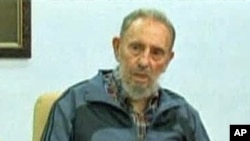Former Cuban President Fidel Castro is again showing up in public after mostly remaining out of sight since falling ill four years ago and ceding power to his brother, Raul. He appeared on Cuban television Monday, after showing up in photos reportedly taken last Wednesday.
Former Cuban President Fidel Castro appeared relaxed and talkative as he answered questions on the Cuban television current affairs program Mesa Redonda or Round Table.
He warned that the West's pressure on Iran and North Korea over their nuclear programs could lead to a full-blown war with both nations.
"They keep going and going," said Castro. "That doesn't stop. I have said it will be a sea of fire, a sea of flames. That's not the problem now. The problem now, I think it's that it [a war] will be let loose there,"
Until the past week, the 83-year-old former leader has avoided the spotlight since undergoing emergency intestinal surgery in 2006. So why is he showing up now?
Peter DeShazo of the Center for Strategic and International Studies in Washington thinks he knows why.
"I think his motivation is first is to show that he's around," said Peter DeShazo. "That he is capable of making decisions or participating in debate on policy."
DeShazo also believes the appearance was timed to coincide with Cuba's release of the first of 52 political prisoners it has promised to set free in the coming months. Seven of those prisoners and their families were flown to exile in Madrid July 13.
DeShazo says Fidel Castro's TV appearance could be a "trade off," or compromise, with his brother, current President Raul Castro, to appease different factions within the Cuban regime.
"A sense that a step is made to release prisoners, and the government is trying to build some bridges in certain areas, but at the same time, the revolutionary side is given its moment in which Fidel Castro is able to excoriate the United States and to continue to lay out the revolutionary credentials, or Cuba's role as a leader of the Third World," he said.
Philip Peters is with the Lexington Institute public policy research group outside of Washington.
He believes Raul Castro recognizes the political costs of keeping dissenters in jail.
"It seems that he [Raul Castro] is not interested in maintaining a population of political prisoners who are in [jail] for these 20 year sentences," said Philip Peters. "My hunch is he would like to get rid of this issue."
Peter DeShazo says regardless of whether Fidel or Raul Castro has the greater influence in Cuban affairs, one thing is certain.
"I think what the Cuban people really want, in the short term, and within the realm of reason, is to live better," he said. "They want to be able to make money, they want to be able to put food on the table, they want to be able to have better lives, they want more freedom to be economic citizens."
DeShazo says those frustration will put greater pressure on the Cuban government in the months ahead.










